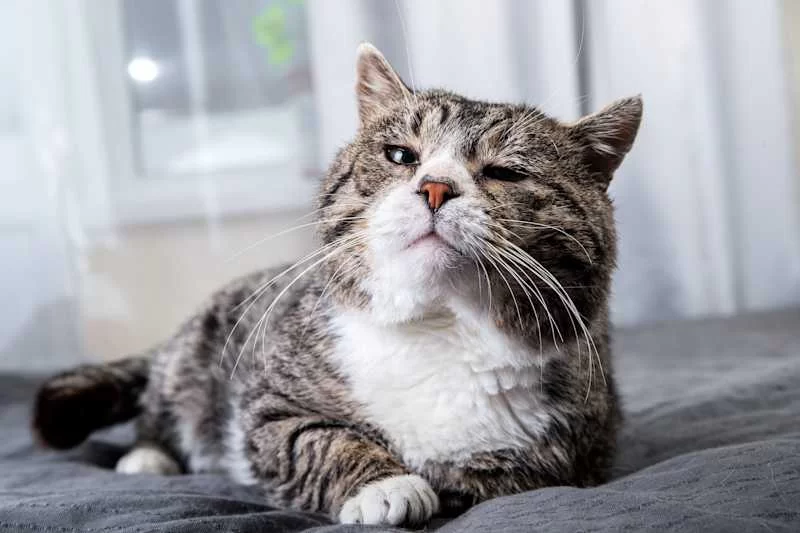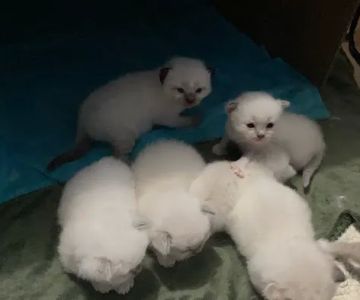Health Problems Senior Cats Face
As a cat owner, you might already know that as your cat grows older, their needs change. Senior cats, typically those over the age of 7, may begin to experience a variety of health problems. These issues can range from common concerns such as arthritis to more serious conditions like kidney disease or hyperthyroidism. Understanding what to look for and how to help your aging feline friend can make a huge difference in their quality of life.
1. Arthritis in Senior Cats
One of the most common health problems in older cats is arthritis. As your cat ages, the cartilage in their joints may start to wear down, causing pain and stiffness. You might notice that your cat is less active, reluctant to jump, or struggles to climb stairs or enter their favorite spot on the couch. It's easy to dismiss these signs as just "getting old," but arthritis is a serious issue that needs attention.
To manage arthritis, a veterinarian might suggest joint supplements or anti-inflammatory medications. Some cats benefit from regular physical therapy or weight management to reduce the stress on their joints. Additionally, providing soft bedding, ramps for high places, and easy access to litter boxes and food dishes can make life a lot easier for your senior cat.

980 E Northwest Hwy, Arlington Heights, IL 60004, USA
See Details2. Kidney Disease in Older Cats
Kidney disease is another common issue among senior cats. The kidneys play a crucial role in filtering waste from the blood, and as cats age, their kidney function can decline. This can lead to symptoms such as increased thirst, frequent urination, weight loss, and poor coat condition. If you notice any of these signs, it’s important to take your cat to the vet for a check-up.
While kidney disease can’t be cured, it can be managed with a special diet and medications. Your veterinarian may recommend a prescription diet that helps support kidney function, as well as medications to manage symptoms and slow down the progression of the disease. Regular check-ups are essential to monitor kidney function and adjust treatment as needed.
3. Hyperthyroidism in Senior Cats
Hyperthyroidism is a common endocrine disorder in senior cats, often caused by benign tumors on the thyroid gland. This condition leads to an overproduction of thyroid hormone, which can cause symptoms like weight loss, increased appetite, vomiting, and hyperactivity. You may notice your cat becoming more restless or exhibiting unusual behaviors like excessive vocalization or pacing.
If your cat is diagnosed with hyperthyroidism, treatment options include medication to regulate thyroid hormone levels, radioactive iodine therapy, or surgery to remove the tumor. Your vet will work with you to determine the best course of action based on your cat’s specific condition and overall health.
4. Dental Disease in Aging Cats
Many senior cats suffer from dental disease, including gingivitis, periodontal disease, and tooth decay. These conditions can cause pain, bad breath, and difficulty eating. Dental problems in cats are often overlooked, but poor dental hygiene can lead to more serious health problems, including infections that affect the kidneys and heart.
Regular dental check-ups and professional cleanings by your vet are essential for keeping your cat's teeth healthy. You may also need to provide your cat with dental treats or special food designed to reduce plaque buildup. It's important to monitor your cat's behavior when eating—if they seem to have difficulty chewing or show signs of pain, consult your veterinarian for advice.
5. Cognitive Dysfunction Syndrome (CDS)
Just like humans, cats can experience changes in brain function as they age. Cognitive Dysfunction Syndrome (CDS) is similar to dementia in humans and can cause disorientation, disrupted sleep patterns, and changes in behavior. Cats with CDS may forget where their litter box is, meow excessively, or become more withdrawn and less interactive with their owners.
If you suspect that your cat might be suffering from CDS, consult your vet. While there is no cure for the condition, there are medications and dietary supplements that can help slow down cognitive decline and improve your cat's quality of life. Ensuring that your cat has a consistent routine and a calm environment can also help alleviate some of the symptoms.
6. Obesity in Senior Cats
Obesity is a common concern for aging cats, particularly if they are less active or have a decreased metabolism. Excess weight can lead to joint problems, heart disease, and diabetes. To prevent obesity in your senior cat, it’s important to monitor their diet and ensure they are getting the right amount of food for their activity level.
Switching to a weight-management formula or consulting with your vet about portion control can help. Encouraging exercise with interactive toys and providing opportunities for climbing or exploration can also help keep your cat active and at a healthy weight.
7. Heart Disease in Senior Cats
Heart disease can develop as cats age, with conditions such as hypertrophic cardiomyopathy (HCM) being particularly common. Symptoms can include coughing, difficulty breathing, lethargy, and loss of appetite. While heart disease can be difficult to detect without veterinary testing, it’s important to look out for any signs that your cat is struggling to breathe or seems overly fatigued.
If your cat is diagnosed with heart disease, your vet may prescribe medications to help manage the condition. Regular check-ups and monitoring are essential to ensure that the disease is being managed effectively.
Tips for Keeping Your Senior Cat Healthy
Keeping your senior cat healthy involves more than just managing health problems—it’s about providing them with the care and attention they need as they age. Here are some tips for maintaining their health:
- Visit your vet regularly for check-ups and screenings.
- Keep your cat's weight under control with a balanced diet.
- Provide a comfortable and safe environment with easy access to food, water, and litter boxes.
- Use ramps and soft bedding to make movement easier and more comfortable.
- Keep your cat mentally stimulated with toys and interactive activities.
- Maintain good dental hygiene with regular cleanings and dental care products.
Conclusion: Helping Your Senior Cat Live a Happy Life
As your cat ages, it's important to stay on top of any health issues and work closely with your veterinarian to ensure that they are comfortable and well-cared-for. With the right care and attention, many senior cats can live happy, healthy lives well into their golden years. Pay attention to their behavior, keep them active, and don't hesitate to consult your vet for advice on how to best manage their health. Your senior cat deserves the best quality of life, and by addressing health problems early, you can help them enjoy their senior years to the fullest.











